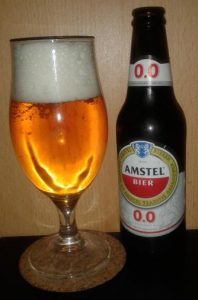
Too many drivers believe that drinking “non-alcoholic” beer or wine while driving eliminates any chance of having a difficult experience with a law-enforcement officer. Unfortunately, this belief may be misplaced.
First, if an officer observes the driver drinking what appears to be an “alcoholic” beverage while driving, the driver will likely be stopped and questioned. Generally, a driver’s constitutional rights require that an officer have either reasonable suspicion or probable cause that the driver is committing a crime or about to commit a crime in order to stop the driver to further investigate a possible DUI offense or even the crime of Possession of an Open Container of Alcohol, depending on the jurisdiction.
For instance, drinking a “non-alcoholic” beer while actually driving may provide sufficient legal grounds for further investigation because the officer cannot determine whether the beer is “non-alcoholic” until he or she can read the label. Most “non-alcoholic” beverages are designed to look like an alcoholic beverage. Thus, the driver may be asked to take field sobriety tests and/or submit to a chemical test(s). The justification for this investigation may simply be that the officer does not know what other beverages may have been previously consumed.
Second, “non-alcoholic” beer is likely not truly “non-alcoholic.” Although advertised as “non-alcoholic,” most “non-alcoholic” beers contain some alcohol—usually less than 0.5% alcohol by volume (ABV). For comparison purposes, alcoholic beer usually contains between between 4-7% ABV, with the average being 5% according to most authorities. See, e.g., American Addiction Centers. Therefore, it takes approximately 10 “non-alcoholic” beers to consume the same amount of alcohol as one alcoholic beer. Accordingly, the officer may detect what he or she believes to be the odor of alcohol, even though they are likely smelling only the flavorings (the congeners).
Keep in mind that it would therefore make it difficult to become legally impaired or in violation of a per se law drinking only “non-alcoholic” beer if one has not consumed any other type of intoxicant. It is also generally believed that a person will eliminate alcohol at the average approximate rate of .015 g/100mL/hour.
As we say in Tennessee: Don’t poke the bear.
About the Author: Steven Oberman has been licensed in Tennessee since 1980, and successfully defended over 2,500 DUI defendants. Steve was the first lawyer in Tennessee to be Board Certified as a DUI Defense Specialist by the National College for DUI Defense, Inc. (NCDD). Among the many honors bestowed upon him, Steve has served as Dean of the NCDD and currently serves as chair of the National Association of Criminal Defense Lawyers DUI Committee.
He is the author of DUI: The Crime & Consequences in Tennessee, updated annually since 1991 (Thomson-West), and co-author with Lawrence Taylor of the national treatise, Drunk Driving Defense, 9th edition (Wolters Kluwer/Aspen). Steve has served as an adjunct professor at the University of Tennessee Law School since 1993 and has received a number of prestigious awards for his faculty contributions. He is a popular international speaker, having spoken at legal seminars in 30 states, the District of Columbia and seven foreign countries. After being named a Fulbright Scholar, Steve was honored to teach as a Visiting Professor at the University of Latvia Law School in the capital city of Riga, Latvia during the Spring Semester of 2019. During the Spring Semester of 2023, Steve taught as a Visiting Professor at Eötvös Loránd University Faculty of Law in Budapest, Hungary. If you would like to contact the author, please visit his website at www.tndui.com.